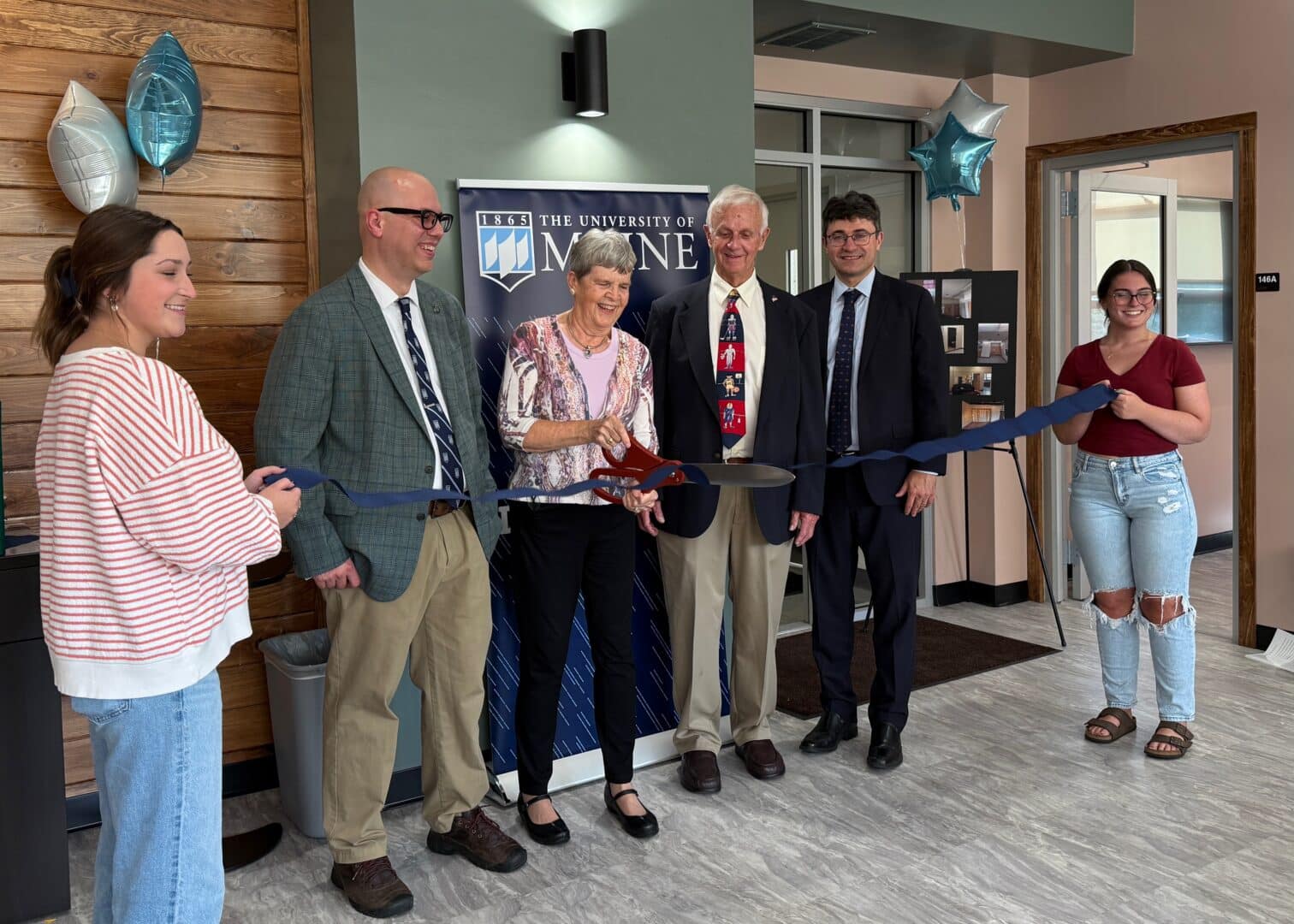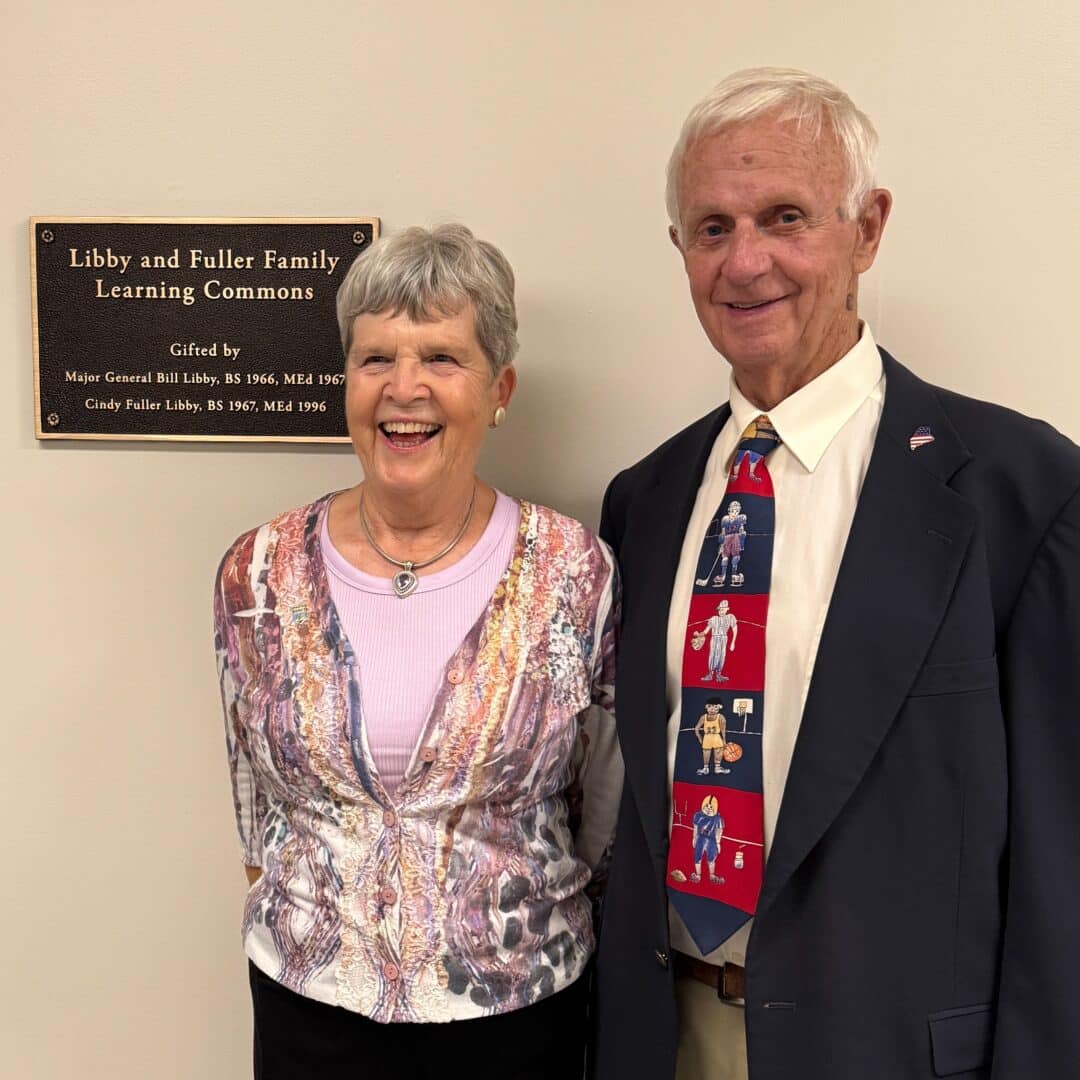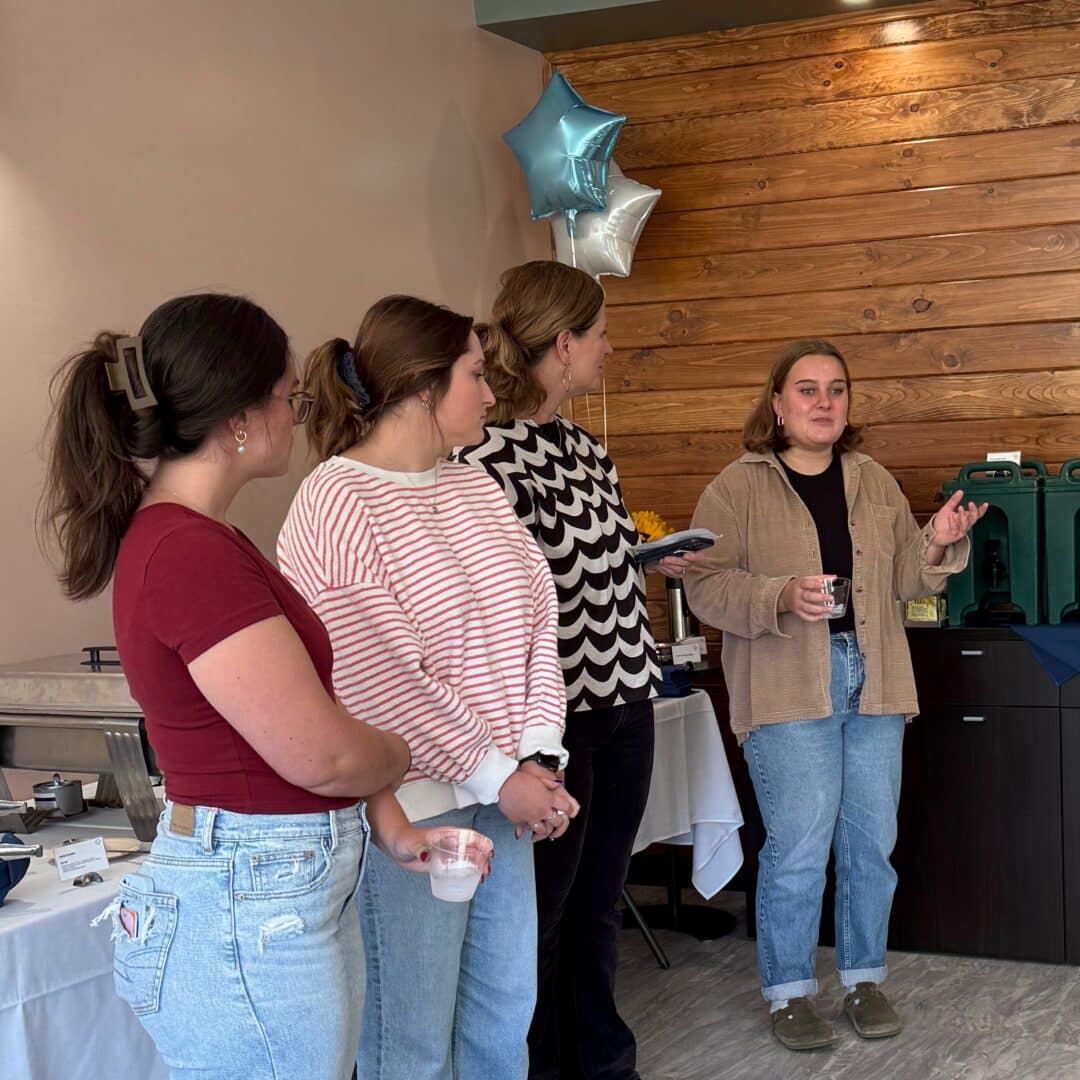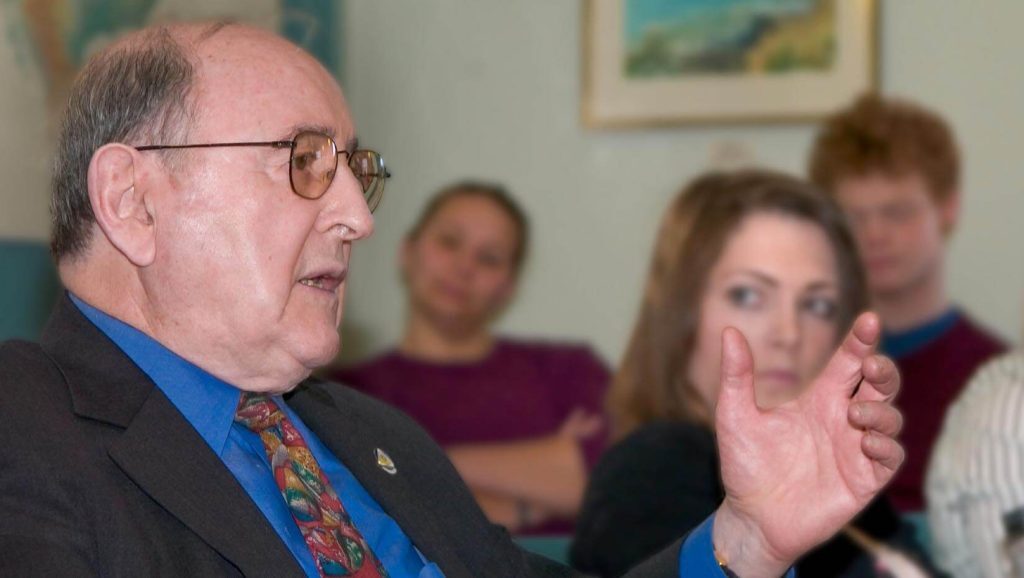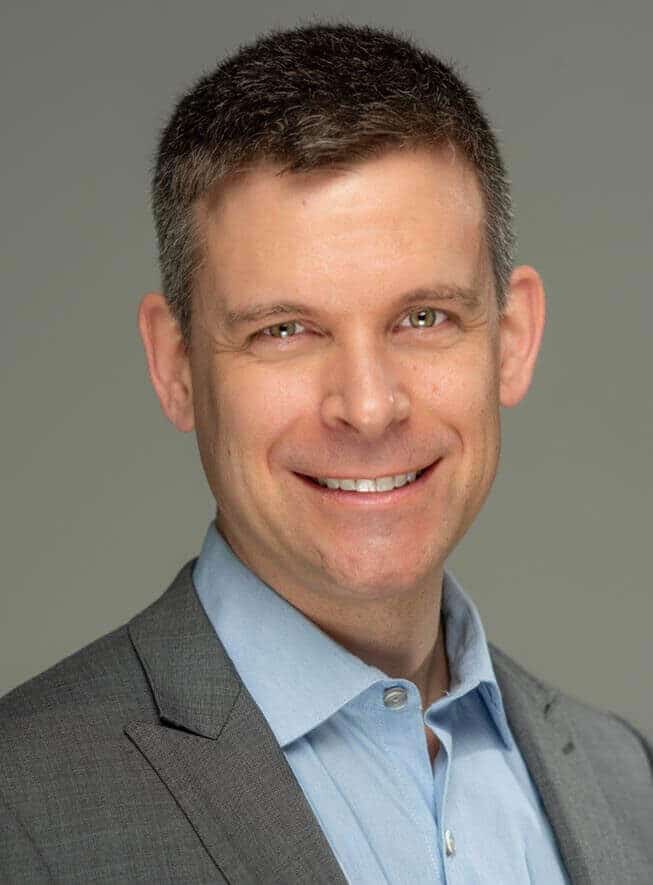ORONO, MAINE: The University of Maine Foundation honored one alum from each of the six colleges with the President Abram W. Harris Award at their 90th Annual Luncheon on Friday, October 18. Awarded every five years, the Harris Award honors alumni who demonstrate exemplary leadership and contribute to their community and/or service to UMaine – traits synonymous with the former President’s efforts to build a stronger institution during his tenure from 1893-1901. Awardees for 2024 included Dr. Alice Reynolds Briones, ’94, Gustavo F. Burkett, ’02, ’05G, Prashanth Chandrasekar, ’02, Charles A. “Chuck” Loring, Jr, ’12, Dr. Paula Quatromoni, ’85, ’86G, and Lindsay Lawrence Videnieks, ’99.
The presentation of the Harris awards concluded with University of Maine Foundation President/CEO, Jeffery Mills, announcing that each of the six awardees would be further honored with $1,000 scholarship awarded in their name. The luncheon was attended by over 200 guests, who heard Mills conclude by thanking awardees for “upholding the excellence of President Harris” in their “exceptional service to UMaine and their community” in their admirable careers. Other highlights of the Foundation luncheon included the announcement of a $16 million gift from the estates of Pierre ’62 and Catherine Labat in support of Black Bear athletics, and recognition of the Foundation’s record-breaking fundraising year of $95 million.
Dr. Alice Reynolds Briones ’94 – College of Liberal Arts and Sciences
Retired U.S Air Force Colonel Dr. Alice Briones, a Hampden, Maine native, earned a degree in clinical laboratory medicine and certification as a medical technologist from the University of Maine in 1994. She has just returned to Maine from Magnolia, Delaware after her appointment by Governor Janet Mills to the State’s Chief Medical Examiner.
Dr. Briones has had an exceptional career of service within the military and medical fields. First enlisting in the U.S. Army in 1990 as a Combat Medic, after graduating from UMaine she was commissioned in the U.S. Air Force as a biomedical sciences corps laboratory officer operating in Luke Air Force base in Arizona and Hanscom Air Force Base in Massachusetts. She would later earn a Doctorate of osteopathic medicine from Lake Erie College Of Osteopathic Medicine in Erie, Pennsylvania in 2005, completed a residency in clinical and anatomic pathology at the University of Rochester Strong Memorial Hospital in Rochester, New York in 2009 and a forensic pathology fellowship with the New Mexico Office of the Medical Examiner in 2010.
Joining the Armed Forces Medical Examiner System in 2010 as a junior Deputy Medical Examiner, Dr. Briones moved on to Director of the Department of Defense Armed Forces DNA Identification Laboratory in 2014. It was in this position that she was part of a team working to identify the remains of 388 personnel on the USS Oklahoma who perished when Japan bombed Pearl Harbor on December 7, 1941. She was promoted in 2017 within the AFMES to Deputy Chief Armed Forces Medical Examiner and again to Director in 2020, becoming the first woman to hold the position.
Now in her critical role as Chief Medical Examiner for the State, she is looking forward to bringing her family, husband Jesus and daughter Jade, back to Maine and continuing the office’s forensic practices and investigations. An already distinguished career under her belt, she will continue further in serving those of her home state.
Gustavo F. Burkett ’02, ’05G – Maine Business School
Gustavo F. Burkett, originally from Argentina, holds a B.S. in business administration (2002) and an M.Ed. in higher education (2005) from the University of Maine. He first came to the state as a high school exchange student at John Bapst Memorial High School, and would return to attend UMaine and begin a career in higher education leadership.
After graduating, Burkett would get his start in leadership at his alma mater as Assistant Director of Campus Activities for Student Organizations and Greek Life and later Director of Campus Activities and Student Engagement before serving as Associate Director of Student Activities and Programming at UNC Charlotte.
In 2012, Burkett would move to Massachusetts to serve as Director of Student Involvement at Boston College, strengthening student organizations and creating strategic plans for student programming and experiential leadership. In 2017, he began an over six year-long tenure as the Senior Associate Dean of Diversity and Community Involvement at MIT. Burkett oversaw more than 500 student organizations, including administrative responsibility for SPXCE Intercultural Center, LBGTQ+ Women and Gender Services, the Campus Activities Complex and more. Advancing community involvement, he also aimed to strengthen cultural awareness and promote social justice, equity and inclusion at the Institute.
Last summer, Burkett returned to Maine after being appointed Dean of the College at Colby. He and his husband, Kyle, now reside in Waterville and Northport. In his role at Colby, he continues to advance his long-standing commitment to student life by fostering inclusive and dynamic learning environments both on campus and globally. Burkett will complete his Ph.D. in higher education and higher education administration from the University of Massachusetts-Boston this fall.
Prashanth Chandrasekar ’02 – College of Engineering and Computing
Prashanth Chandrasekar graduated Summa Cum Laude with a B.S. in computer engineering in 2002. He is a proven technology executive with a background in leading and scaling high-growth global organizations in senior leadership roles. An international alum, Chandrasekar held student leadership positions at the Association for Computing Machinery, the International Students Association, and was a member of Sigma Phi Epsilon (SigEp) during his time at UMaine.
Chandrasekar continued his education, earning a M.Eng in engineering management from Cornell University and later an MBA from Harvard Business School. He started out at companies such as Broadcom Inc, Texas Instruments and Capgemini Consulting before joining Barclays Investment Bank in New York City in 2008. First Assistant Vice President/Associate, he was promoted to Vice President and worked to provide strategic and mergers and acquisitions advice for clients in the technology, media and telecom industries.
Moving to Rackspace Technology in Texas in 2012, Chandrasekar would go on to hold numerous senior leadership positions and lead some of the fastest growing businesses in Rackspace history. Chandrasekar was Senior Vice President of the Cloud & Infrastructure business and also led the Managed Public Clouds business, which focused on the management of the world’s leading public clouds such as Amazon Web Services, Microsoft Azure and Google Cloud Platform.
In 2019, Chandrasekar was appointed CEO of Stack Overflow, the world’s largest and most trusted community and platform for developers and technologists. He aims to empower the world to develop technology through collective knowledge, serving over 100 million global monthly visitors and Stack Overflow’s market-leading Enterprise knowledge sharing SaaS and GenAI products. Chandrasekar successfully led the exit of the business for $1.8 billion in 2021.
Chandrasekar serves on the Board of Visitors at the University of Maine and has also served on the Harvard Business School Alumni Board and on the Cornell Engineering Advisory Board. He currently resides in San Antonio, Texas with his wife and their two children.
Charles A. “Chuck” Loring, Jr. ’12 – College of Earth, Life and Health Sciences
Lifelong member of the Penobscot Indian Nation, Charles A. “Chuck” Loring, Jr earned a degree in forest operations science from the University of Maine in 2012. Upon graduation, Loring continued a long family history of service to the Penobscot Indian Nation’s (PIN) Department of Natural Resources, responsible for monitoring and maintaining the PIN’s fisheries, wildlife, and forests.
Promoted to Director of the Department of Natural Resources in 2021, he administers and oversees nine conservation programs ranging from agriculture to game wardens. Managing over 128,000 acres and supervising more than 20 people within the department, sustainability is at the forefront of his mission.
In addition to his day-to-day responsibilities as Director, Loring is leading the Penobscot Nation through the return of tribal lands with The Trust for Public Land in a $32 Million-dollar fundraising project. TPL purchased over 30,000 acres back from The Conservation Fund in 2022 and came to the Penobscots to offer a partnership. Known as the Wahsehtek project, this land includes traditional Penobscot territory around the East branch of the Penobscot river and will provide connectivity of conservation minded ownership and easements from the East Branch all the way to Jackman and Moosehead lake. This will aid in returning sovereignty over an area PIN ancestors lived and cared for for generations. The project would mark the single largest land return in history to a tribal nation from a US-based nonprofit.
Upon the hopeful completion of transfer, Loring’s duties would expand to incorporate the reclaimed Wahsehtek land. The Department hopes to restore the area as a source of sustainable timber and a place to fish and hunt. Plans include erosion control of the river habitat with careful forestry practices and auctioning off moose hunts, led by tribal guides, to non-tribal hunters. Loring will continue to foster healthy and climate-change-preventing stewardship in this new role. Loring currently resides in Corinth, Maine with his wife, Danica and daughter, River, where they spend much of their time on their new farm.
Paula Quatromoni ’85, ’86G – College of Education and Human Development
Nutrition researcher, public health advocate and Boston University Professor Dr. Paula Quatromoni earned a B.S. in food and nutrition (1985) and an M.S. in human development (1986) from UMaine. A registered dietitian and educator, she has deep clinical roots and research expertise in diet and chronic disease prevention, childhood and adult obesity, school-based health promotion, sports nutrition, and the prevention and treatment of eating disorders.
After completing her degrees at UMaine, Dr. Quatromoni went on to obtain a Doctorate of Science in epidemiology from the Boston University School of Public Health in 2001. She began her academic career at BU when she was hired as an Assistant Professor in the Department of Health Sciences at BU’s Sargent College of Health and Rehabilitation Sciences in 2002. She was tenured and promoted to the rank of Associate Professor in 2009. Dr. Quatromoni holds secondary appointments in the Department of Epidemiology at the BU School of Public Health, the Division of Graduate Medical Sciences at the BU School of Medicine, and the Graduate School in BU’s College of Arts and Sciences. An award-winning educator, Dr. Quatromoni has been awarded for teaching excellence by several schools at Boston University and nationally, from the Academy of Nutrition and Dietetics.
Dr. Quatromoni is an Investigator on the world-renowned Framingham Heart Study with collaborations spanning more than 25 years. This line of research informs not only U.S. Dietary Guidelines policy, but also dietary interventions for the prevention and treatment of cardiometabolic disease, obesity, and a variety of other health outcomes. Her funded research includes several projects in schools and communities to improve diet and physical activity behaviors of school-age children. Dr. Quatromoni is considered one of the nation’s top minds in the field of treatment and prevention of eating disorders in athletes. She is one of the most prominent authors in the peer-reviewed literature to include the voice of the registered dietitian in the eating disorders field. Dr. Quatromoni disseminates her research widely; she’s published more than 70 peer-reviewed papers and her Framingham Study work on dietary patterns significantly contributed to the advancement of research methods used in nutritional epidemiology today. Bringing research into the classroom, she developed and teaches an annual global study abroad course in Padova, Italy on the food, cultural, environmental, and health impacts of the Mediterranean dietary pattern and lifestyle.
Dr. Quatromoni recently completed nine years of service as Department Chair of Health Sciences for Boston University, and now is serving as Director of the Programs in Nutrition. She is the recent past-Chair of the Sports and Human Performance Nutrition dietetic practice group of the Academy of Nutrition and Dietetics. She serves as an Advisory Board Member for two non-profit organizations: the Running in Silence Foundation and CYCLE Kids, and she served the American Heart Association for years as a public health advocate. A Senior Consultant for Monte Nido Walden, she is a co-creator of the GOALS program, an intensive outpatient specialty program treating athletes with eating disorders. Dr. Quatromoni is a mother of three and is excitedly awaiting the imminent birth of her first two grandchildren. She currently resides on Cape Cod, Massachusetts.
Lindsay Lawrence Videnieks ’99 – Honors College
A first-generation college graduate, Lindsay Lawrence Videnieks earned a B.A. from the University of Maine in 1999, double-majoring in english and political science. Growing up below the poverty line in rural Maine as the daughter of a single mother and working her way through college and law school, Videnieks, in her over 20-year career in public policy, pulls from these early challenges to drive her work ethic and interest in giving back to causes that help uplift others.
While at UMaine, Videnieks took part in the Peter Madigan Congressional Internship Program, interning in the Office of John E. Baldacci (ME-2). This would provide a background for her work post-graduation at the government relations firm Cassidy & Associates. Later, she worked with Los Angeles-based government affairs agency Cerrell Associates before becoming a Managing Director of the DCI Group, a public relations, lobbying and business consulting firm.
In 2010, Videnieks graduated with a J.D. from Catholic University and joined the Washington D.C. public affairs firm Woodberry Associates. At Woodberry, Videnieks brings her public policy background to guide and support companies, non-profits, and allied stakeholders by using a campaign approach to solving complex policy issues. Her projects have included funding for transportation initiatives, moving patient centered legislation, lead service line replacement, federal courthouse construction and economic development initiatives. She is now a Partner and Senior Vice President of Strategic Alliances at Woodberry where she also manages the intern program, providing a foundation for young professionals to grow and find mentorship opportunities.
In her advocacy work and from her own upbringing, Videnieks understands the importance of everyone getting a fair chance at higher education and wants to make a difference for those facing similar challenges. An Honors College alumna, she established the UMaine First Gen Honors Opportunity Fund in 2022 to lower barriers and ease access for future students who share her roots. Videnieks continues to uplift others through her work in voter protection, providing support and counsel to voter protection programs nationwide. She currently resides in Rockville, Maryland with her husband Markus and their three children.
About the University of Maine Foundation: The University of Maine Foundation is dedicated to supporting the University of Maine by securing and managing private gifts to enhance the University’s mission of teaching, research, and public service. Through the generosity of alumni and friends, the Foundation strives to ensure the continued growth and success of the university.
About the University of Maine: As Maine’s only public research university and a Carnegie R1 top-tier research institution, the University of Maine advances learning and discovery through excellence and innovation. Founded in 1865 in Orono, UMaine is the state’s land, sea and space grant university with a regional campus at the University of Maine at Machias. Our students come from all over the world and work with faculty conducting fieldwork around the globe — from the North Atlantic to the Antarctic. Located on Marsh Island in the homeland of the Penobscot Nation with UMaine Machias located in the homeland of the Passamaquoddy Nation, UMaine’s statewide mission is to foster an environment that creates tomorrow’s leaders. As the state’s flagship institution, UMaine offers nearly 200 degree programs through which students can earn bachelor’s, master’s, professional master’s and doctoral degrees as well as graduate certificates. For more information about UMaine and UMaine Machias, visit umaine.edu/about/quick-facts and machias.edu/about-umm/umm-facts.
